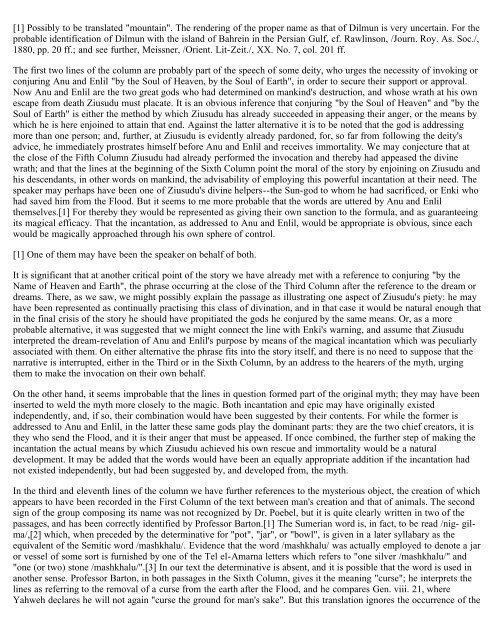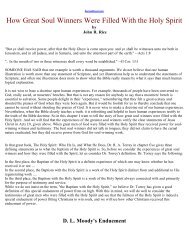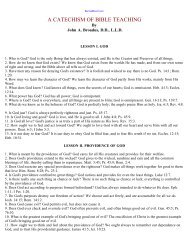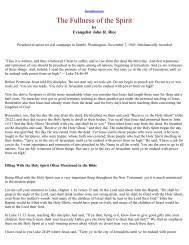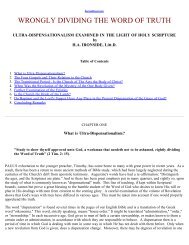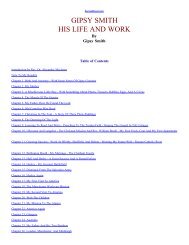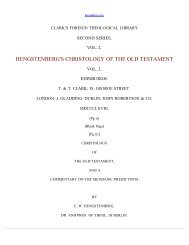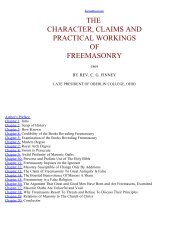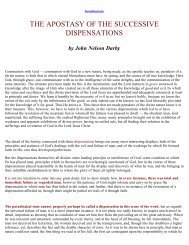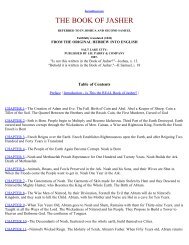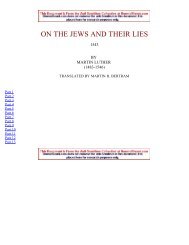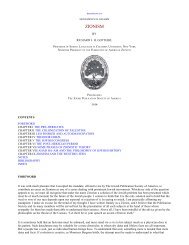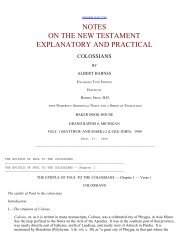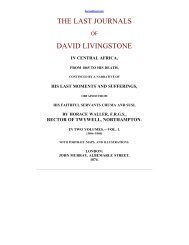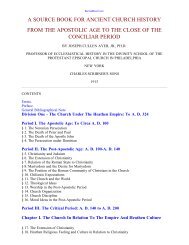Legends of Babylon and Egypt in Relation to Hebrew Tradition.pdf
Legends of Babylon and Egypt in Relation to Hebrew Tradition.pdf
Legends of Babylon and Egypt in Relation to Hebrew Tradition.pdf
You also want an ePaper? Increase the reach of your titles
YUMPU automatically turns print PDFs into web optimized ePapers that Google loves.
[1] Possibly <strong>to</strong> be translated "mounta<strong>in</strong>". The render<strong>in</strong>g <strong>of</strong> the proper name as that <strong>of</strong> Dilmun is very uncerta<strong>in</strong>. For the<br />
probable identification <strong>of</strong> Dilmun with the isl<strong>and</strong> <strong>of</strong> Bahre<strong>in</strong> <strong>in</strong> the Persian Gulf, cf. Rawl<strong>in</strong>son, /Journ. Roy. As. Soc./,<br />
1880, pp. 20 ff.; <strong>and</strong> see further, Meissner, /Orient. Lit-Zeit./, XX. No. 7, col. 201 ff.<br />
The first two l<strong>in</strong>es <strong>of</strong> the column are probably part <strong>of</strong> the speech <strong>of</strong> some deity, who urges the necessity <strong>of</strong> <strong>in</strong>vok<strong>in</strong>g or<br />
conjur<strong>in</strong>g Anu <strong>and</strong> Enlil "by the Soul <strong>of</strong> Heaven, by the Soul <strong>of</strong> Earth", <strong>in</strong> order <strong>to</strong> secure their support or approval.<br />
Now Anu <strong>and</strong> Enlil are the two great gods who had determ<strong>in</strong>ed on mank<strong>in</strong>d's destruction, <strong>and</strong> whose wrath at his own<br />
escape from death Ziusudu must placate. It is an obvious <strong>in</strong>ference that conjur<strong>in</strong>g "by the Soul <strong>of</strong> Heaven" <strong>and</strong> "by the<br />
Soul <strong>of</strong> Earth" is either the method by which Ziusudu has already succeeded <strong>in</strong> appeas<strong>in</strong>g their anger, or the means by<br />
which he is here enjo<strong>in</strong>ed <strong>to</strong> atta<strong>in</strong> that end. Aga<strong>in</strong>st the latter alternative it is <strong>to</strong> be noted that the god is address<strong>in</strong>g<br />
more than one person; <strong>and</strong>, further, at Ziusudu is evidently already pardoned, for, so far from follow<strong>in</strong>g the deity's<br />
advice, he immediately prostrates himself before Anu <strong>and</strong> Enlil <strong>and</strong> receives immortality. We may conjecture that at<br />
the close <strong>of</strong> the Fifth Column Ziusudu had already performed the <strong>in</strong>vocation <strong>and</strong> thereby had appeased the div<strong>in</strong>e<br />
wrath; <strong>and</strong> that the l<strong>in</strong>es at the beg<strong>in</strong>n<strong>in</strong>g <strong>of</strong> the Sixth Column po<strong>in</strong>t the moral <strong>of</strong> the s<strong>to</strong>ry by enjo<strong>in</strong><strong>in</strong>g on Ziusudu <strong>and</strong><br />
his descendants, <strong>in</strong> other words on mank<strong>in</strong>d, the advisability <strong>of</strong> employ<strong>in</strong>g this powerful <strong>in</strong>cantation at their need. The<br />
speaker may perhaps have been one <strong>of</strong> Ziusudu's div<strong>in</strong>e helpers--the Sun-god <strong>to</strong> whom he had sacrificed, or Enki who<br />
had saved him from the Flood. But it seems <strong>to</strong> me more probable that the words are uttered by Anu <strong>and</strong> Enlil<br />
themselves.[1] For thereby they would be represented as giv<strong>in</strong>g their own sanction <strong>to</strong> the formula, <strong>and</strong> as guarantee<strong>in</strong>g<br />
its magical efficacy. That the <strong>in</strong>cantation, as addressed <strong>to</strong> Anu <strong>and</strong> Enlil, would be appropriate is obvious, s<strong>in</strong>ce each<br />
would be magically approached through his own sphere <strong>of</strong> control.<br />
[1] One <strong>of</strong> them may have been the speaker on behalf <strong>of</strong> both.<br />
It is significant that at another critical po<strong>in</strong>t <strong>of</strong> the s<strong>to</strong>ry we have already met with a reference <strong>to</strong> conjur<strong>in</strong>g "by the<br />
Name <strong>of</strong> Heaven <strong>and</strong> Earth", the phrase occurr<strong>in</strong>g at the close <strong>of</strong> the Third Column after the reference <strong>to</strong> the dream or<br />
dreams. There, as we saw, we might possibly expla<strong>in</strong> the passage as illustrat<strong>in</strong>g one aspect <strong>of</strong> Ziusudu's piety: he may<br />
have been represented as cont<strong>in</strong>ually practis<strong>in</strong>g this class <strong>of</strong> div<strong>in</strong>ation, <strong>and</strong> <strong>in</strong> that case it would be natural enough that<br />
<strong>in</strong> the f<strong>in</strong>al crisis <strong>of</strong> the s<strong>to</strong>ry he should have propitiated the gods he conjured by the same means. Or, as a more<br />
probable alternative, it was suggested that we might connect the l<strong>in</strong>e with Enki's warn<strong>in</strong>g, <strong>and</strong> assume that Ziusudu<br />
<strong>in</strong>terpreted the dream-revelation <strong>of</strong> Anu <strong>and</strong> Enlil's purpose by means <strong>of</strong> the magical <strong>in</strong>cantation which was peculiarly<br />
associated with them. On either alternative the phrase fits <strong>in</strong><strong>to</strong> the s<strong>to</strong>ry itself, <strong>and</strong> there is no need <strong>to</strong> suppose that the<br />
narrative is <strong>in</strong>terrupted, either <strong>in</strong> the Third or <strong>in</strong> the Sixth Column, by an address <strong>to</strong> the hearers <strong>of</strong> the myth, urg<strong>in</strong>g<br />
them <strong>to</strong> make the <strong>in</strong>vocation on their own behalf.<br />
On the other h<strong>and</strong>, it seems improbable that the l<strong>in</strong>es <strong>in</strong> question formed part <strong>of</strong> the orig<strong>in</strong>al myth; they may have been<br />
<strong>in</strong>serted <strong>to</strong> weld the myth more closely <strong>to</strong> the magic. Both <strong>in</strong>cantation <strong>and</strong> epic may have orig<strong>in</strong>ally existed<br />
<strong>in</strong>dependently, <strong>and</strong>, if so, their comb<strong>in</strong>ation would have been suggested by their contents. For while the former is<br />
addressed <strong>to</strong> Anu <strong>and</strong> Enlil, <strong>in</strong> the latter these same gods play the dom<strong>in</strong>ant parts: they are the two chief crea<strong>to</strong>rs, it is<br />
they who send the Flood, <strong>and</strong> it is their anger that must be appeased. If once comb<strong>in</strong>ed, the further step <strong>of</strong> mak<strong>in</strong>g the<br />
<strong>in</strong>cantation the actual means by which Ziusudu achieved his own rescue <strong>and</strong> immortality would be a natural<br />
development. It may be added that the words would have been an equally appropriate addition if the <strong>in</strong>cantation had<br />
not existed <strong>in</strong>dependently, but had been suggested by, <strong>and</strong> developed from, the myth.<br />
In the third <strong>and</strong> eleventh l<strong>in</strong>es <strong>of</strong> the column we have further references <strong>to</strong> the mysterious object, the creation <strong>of</strong> which<br />
appears <strong>to</strong> have been recorded <strong>in</strong> the First Column <strong>of</strong> the text between man's creation <strong>and</strong> that <strong>of</strong> animals. The second<br />
sign <strong>of</strong> the group compos<strong>in</strong>g its name was not recognized by Dr. Poebel, but it is quite clearly written <strong>in</strong> two <strong>of</strong> the<br />
passages, <strong>and</strong> has been correctly identified by Pr<strong>of</strong>essor Bar<strong>to</strong>n.[1] The Sumerian word is, <strong>in</strong> fact, <strong>to</strong> be read /nig- gilma/,[2]<br />
which, when preceded by the determ<strong>in</strong>ative for "pot", "jar", or "bowl", is given <strong>in</strong> a later syllabary as the<br />
equivalent <strong>of</strong> the Semitic word /mashkhalu/. Evidence that the word /mashkhalu/ was actually employed <strong>to</strong> denote a jar<br />
or vessel <strong>of</strong> some sort is furnished by one <strong>of</strong> the Tel el-Amarna letters which refers <strong>to</strong> "one silver /mashkhalu/" <strong>and</strong><br />
"one (or two) s<strong>to</strong>ne /mashkhalu/".[3] In our text the determ<strong>in</strong>ative is absent, <strong>and</strong> it is possible that the word is used <strong>in</strong><br />
another sense. Pr<strong>of</strong>essor Bar<strong>to</strong>n, <strong>in</strong> both passages <strong>in</strong> the Sixth Column, gives it the mean<strong>in</strong>g "curse"; he <strong>in</strong>terprets the<br />
l<strong>in</strong>es as referr<strong>in</strong>g <strong>to</strong> the removal <strong>of</strong> a curse from the earth after the Flood, <strong>and</strong> he compares Gen. viii. 21, where<br />
Yahweh declares he will not aga<strong>in</strong> "curse the ground for man's sake". But this translation ignores the occurrence <strong>of</strong> the


